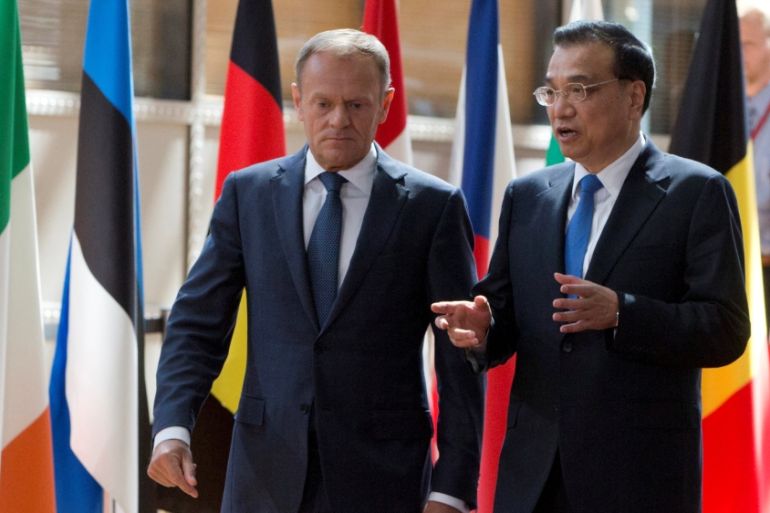Trade dispute holds up EU-China climate statement
Trump’s withdrawal from the Paris accord brings the two industrial powers closer, but they remain divided on trade.

China and the European Union have reaffirmed their commitments to fight global warming but failed to agree on a formal climate statement due to divisions over trade.
Friday’s development came a day after President Donald Trump announced a US withdrawal from the Paris climate agreement.
Keep reading
list of 4 itemsEU urges China to use influence on Russia and Iran
‘No to the Russian law!’ Georgia protesters demand a ‘European future’
Polish politicians condemn Warsaw synagogue firebombing
Speaking alongside Li Keqiang, China’s premier, the EU’s Donald Tusk said efforts to reduce pollution and combat rising sea levels would now continue without the United States.
But the differences over trade and steel production underscored the differences in a sometimes difficult EU-China relationship.
|
|
“We are convinced that yesterday’s decision by the United States to leave the Paris agreement is a big mistake,” Tusk, who chairs EU summits as the head of the European Council, told a news conference with Li and Jean-Claude Juncker, the EU’s chief executive.
“The fight against climate change, and all the research, innovation and technological progress it will bring, will continue, with or without the US.”
In their meeting, the three leaders committed to cutting back on fossil fuels, developing more green technology and helping raise funds to help poorer countries cut their emissions, but a dispute about trade ties scuppered plans for a formal joint statement.
Despite what officials described as a warm meeting, China and the EU could not agree on a broader final communique meant to focus on a range of other issues discussed at the talks, including a commitment to free trade and measures needed to reduce a global steel glut.
The leaders’ news conference was delayed for three hours as they sought to find agreement.
READ MORE: World reacts to Trump’s Paris climate accord withdrawal
According to one person present at the summit, China’s insistence on a reference that the EU will eventually recognise China as an economy driven by the market, not the state, blocked the final 60-point statement.
That also meant there could be no agreement on a formal pledge to work together to reduce global steel production.
China’s annual steel output is almost double the EU’s total production and Western governments say Chinese steel exports have caused a global steel crisis.
That theme was an undercurrent of the daylong meeting.
|
|
Before the formal EU-China summit got under way, Juncker referred at a business conference with Li to a World Bank report placing China 78th out of 190 countries in terms of the ease of doing business.
“A big economic powerhouse needs to be higher than mid-table,” he said, adding that a planned EU-Chinese investment treaty needed to be completed to ensure reciprocal relations.
France, Germany and Italy have mooted the idea of allowing the EU to block Chinese investment in Europe, partly because European companies are denied similar access in China and because of risks of China acquiring prized European technology.
Trade balance
In reply, Li said China was working hard to promote a trade balance, with Chinese tourism to Europe now far greater than EU tourism in China.
Foreign investment opportunities, he said, were far different from when China first opened up.
“I do hope you can put things into context. We find the problems, but we are working on them … Our ranking is getting better,” he said.
Trump’s announcement on Thursday that he would take the US out of the Paris accord, saying the agreement would undermine the US economy and cost jobs, has drawn anger and condemnation from world leaders and heads of industry.
China overtook the US as the world’s biggest emitter of greenhouse gases in 2007.
|
|